
QE pupils have picked up crucial skills – as well as awards – at two prestigious Model United Nations conferences in London and one hosted by an élite university in the US.
On the same weekend that one group of boys was rubbing shoulders with visiting delegates from around the world at HABSMUN (hosted by Haberdashers’ Elstree Schools), Year 11’s Vu-Lam Le-Nguyen was enjoying success during the London Youth Model United Nations (LYMUN) at the LSE. These events came just a few weeks after Year 11’s Keshav Aggarwal (pictured) had become one of only seven delegates to win a Best Delegate award at the prestigious MUN hosted by Massachusetts Institute of Technology (MIT).
Headmaster Neil Enright said: “I am pleased to see our boys throwing themselves into these very worthwhile events and I congratulate them on their successes. Debating is an important way for our pupils to acquire confidence, hone skills in public-speaking, develop their ability to build an argument, and learn to think on their feet.”
Vu-Lam explained that LYMUN 2025 involved over 560 delegates from UK schools such as Eton and Harrow, as well as from schools in Portugal, Sweden, France and other nations worldwide.
“I was part of the US Senate, one of the special signature committees, and played the role of the Republican Senator John Thune. Like Senator Thune in real life, I won my party’s leadership election on the first day to become the Senator Majority Leader, granting me both privileges and responsibilities to set the tone for debate and direct my party in passing (or opposing) bills. This year, the topic was to envision a new age of American energy in the aftermath of a fictional Great Midwestern Blackout.
“In the closing ceremony, I was awarded the Bipartisanship (Diplomacy) Award, not only for outstanding public speaking and performance, but also for my subtle concessions to foster bipartisan cooperation (in a hugely divided Senate).” Vu-Lam, who aspires to an eventual real-world career in international relations, said he was especially proud that the MUN’s Secretariat said in its comments that the award went to delegates who best assumed the role of real diplomats in committees.
Keshav Aggarwal’s award at MIT was for his contribution representing Australia at the Social, Humanitarian and Cultural Committee (SOCHUM) – one of seven committees operating at the conference. Since no overall conference awards were given, this was one of the event’s top accolades.
With him at the conference were several hundred delegates from countries as far apart as Peru and Kazakhstan, as well as the US delegates and others from the UK. MIT itself describes it as “the premier international MUN conference for high school students, with a special focus on small committee sizes”.
The theme was Tech Diplomacy: delegates were charged with evaluating the global political impact of new technologies and strengthening or amending regulation to foster innovation. The SOCHUM committee members debated Regulating Cryptocurrency to Foster Innovation While Mitigating Risks and Mass Surveillance and Data Exploitation.
“It was great to interact with delegates from around the world with their different perspectives on global politics, and with differing cultural backgrounds,” said Keshav. “It also provided a great insight into studying at MIT: I got to interact with a range of student leaders, and learning about their experience at studying at MIT and living in Boston.”
He found time to visit neighbouring Harvard University, where he duly rubbed the foot of the statue of John Harvard, the 17th-century Puritan clergyman whose bequest helped establish the Ivy League institution. “Legend and rumours have it that by rubbing the golden foot of the statue, students gain luck and the ‘blessings’ of John Harvard for all their academic endeavours.”
Keshav and his fellow delegates heard from guest speaker Fadel Adib, Founding Director of the MIT Signal Kinetics Research Group, whose research has led to the establishment of multiple start-ups.
The group of Elizabethans making their way to HABSMUN included Samuel Sobolak, of Year 9, who reported that delegates had quickly got into their stride, lobbying fiercely in their committees to rally support for their resolutions.
“Day two brought about a rigorous seven-hour debate in the General Assembly, where delegates sparred over resolutions, thinking on their feet under pressure: a perfect opportunity to improve public-speaking skills,” said Samuel.
“Speaking in front of dozens of delegates may be overwhelming, so in order to unwind, students took part in a karaoke showdown, with each committee singing their hearts out for first place.”
The QE contingent picked up a number of awards, he said, and made many new friends: “An intense but unforgettable weekend of diplomatic fun!”
Fellow HABSMUN delegate Nikhil Francine, of Year 10, added: “Learning that there were others that were passionate about solving the pressing issues of the world, ranging from health to disarmament and security, was fascinating to see.”
Like Samuel, he enjoyed both the formal debates and the event’s more relaxed moments. “Overall, it was a brilliant experience, in which I made new friends from outside QE, had lots of fun and crucially boosted my confidence, debating and public-speaking skills.”



 Headmaster Neil Enright said: “I congratulate our students for taking the initiative and organising this visit, for the preparation they did ahead of taking part in the debates, and for the level of their performance in the debates: they did the School proud!”
Headmaster Neil Enright said: “I congratulate our students for taking the initiative and organising this visit, for the preparation they did ahead of taking part in the debates, and for the level of their performance in the debates: they did the School proud!” Two other QE delegates, Chanakya and Uday, won Best Position Paper awards. Position papers are single-A4 page documents written to outline the views of the country or group the delegates are representing. Chanakya’s was for his paper for the United Nations Framework Convention on Climate Change (UNFCC) and Uday’s award was for his work for the Economic and Financial Committee (ECOFIN). Uday also received an honourable mention when it came to selecting the best delegate across all the committees.
Two other QE delegates, Chanakya and Uday, won Best Position Paper awards. Position papers are single-A4 page documents written to outline the views of the country or group the delegates are representing. Chanakya’s was for his paper for the United Nations Framework Convention on Climate Change (UNFCC) and Uday’s award was for his work for the Economic and Financial Committee (ECOFIN). Uday also received an honourable mention when it came to selecting the best delegate across all the committees.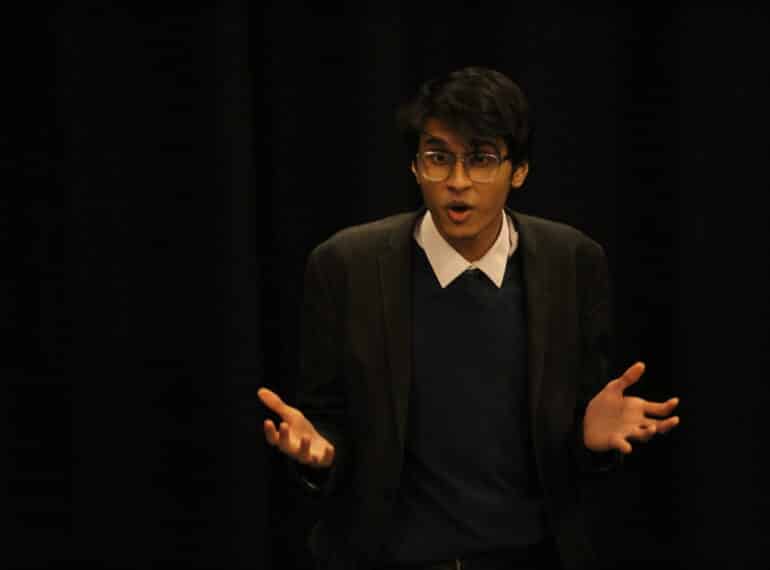
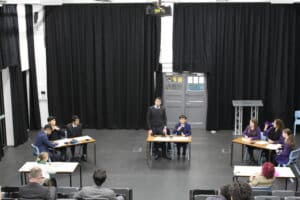 The studio, created from two existing large rooms towards the rear of the Main Building, hosted early rounds of the English Speaking Union’s Schools’ Mace debating contest and of the national Performing Shakespeare competition.
The studio, created from two existing large rooms towards the rear of the Main Building, hosted early rounds of the English Speaking Union’s Schools’ Mace debating contest and of the national Performing Shakespeare competition.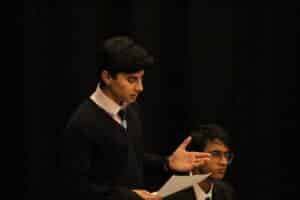 At the Mace, the country’s oldest and largest debating competition for schools, a senior QE team – including School Captain Chanakya Seetharam, as well as Zaki Mustafa, and Koustuv Bhowmick, all from Year 13 – took on Haberdashers’ Girls’ School. Other leading schools from North London and Hertfordshire also competed. The QE team won the event to progress to the second-round heats in January.
At the Mace, the country’s oldest and largest debating competition for schools, a senior QE team – including School Captain Chanakya Seetharam, as well as Zaki Mustafa, and Koustuv Bhowmick, all from Year 13 – took on Haberdashers’ Girls’ School. Other leading schools from North London and Hertfordshire also competed. The QE team won the event to progress to the second-round heats in January. 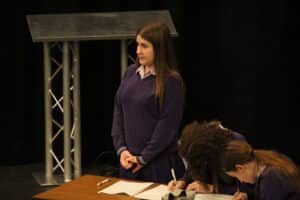 Head of English Robert Hyland said: “There are some things which reading Shakespeare simply as words on the page can never give – so much of the impact of his work comes from how performers have chosen to interpret, following the rhythms and the imagery of the poetry to bring the words to life.
Head of English Robert Hyland said: “There are some things which reading Shakespeare simply as words on the page can never give – so much of the impact of his work comes from how performers have chosen to interpret, following the rhythms and the imagery of the poetry to bring the words to life. 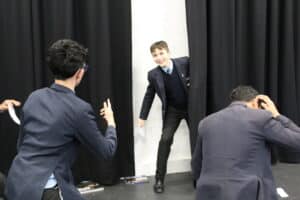 The special English lesson held in RDS also focused on Shakespeare, looking at scene 3 from act 3 of
The special English lesson held in RDS also focused on Shakespeare, looking at scene 3 from act 3 of 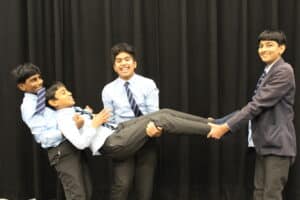 “We subsequently returned to the language, thinking about the delivery of the speech which Ariel gives, and what key or words ideas come to light when presented dramatically.”
“We subsequently returned to the language, thinking about the delivery of the speech which Ariel gives, and what key or words ideas come to light when presented dramatically.” 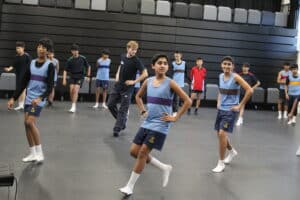 ENB dancers and a musician later came to QE and gave the boys a two-hour contemporary ballet workshop, testing the RDS’s audio equipment to the full. They explored ways of moving, inspired by the plot, characters and choreography of
ENB dancers and a musician later came to QE and gave the boys a two-hour contemporary ballet workshop, testing the RDS’s audio equipment to the full. They explored ways of moving, inspired by the plot, characters and choreography of 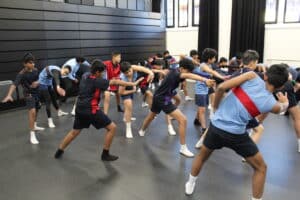 “Best of all though was the enthusiasm and energy the boys put into their dancing. Who knows – maybe the next Akram Khan has just learnt his first dance steps?
“Best of all though was the enthusiasm and energy the boys put into their dancing. Who knows – maybe the next Akram Khan has just learnt his first dance steps?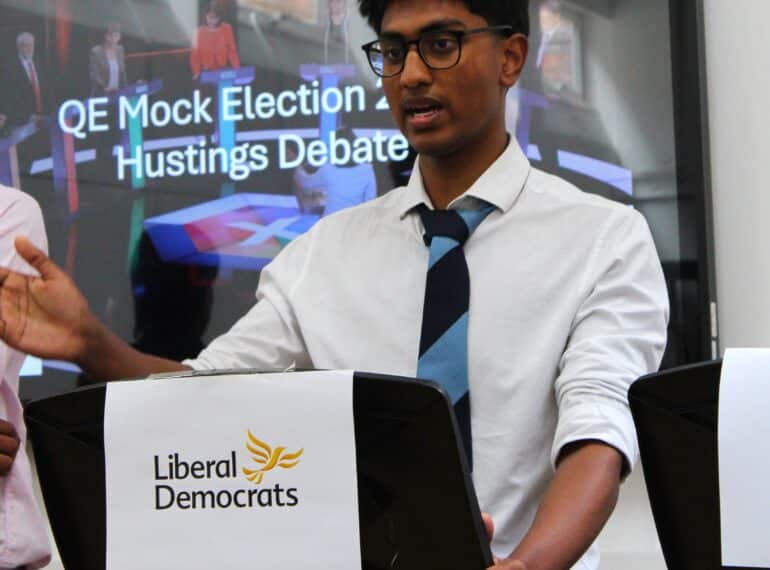
 In the School’s mock election, the Liberal Democrats emerged as easily the biggest party, with 21 of the 46 seats in QE’s parliament.
In the School’s mock election, the Liberal Democrats emerged as easily the biggest party, with 21 of the 46 seats in QE’s parliament. The run-up to the mock election included a hustings, where parties made their pitches and fielded questions from the audience. All the candidates were drawn from Year 12.
The run-up to the mock election included a hustings, where parties made their pitches and fielded questions from the audience. All the candidates were drawn from Year 12. In fact, turnout among Year 7 was easily the highest, at almost 80%. Only small numbers of Year 11 cast votes, having recently completed their GCSEs, while Year 13 have already left (and no postal votes were available). One seat was allocated for each of the 46 forms in the School, excluding forms in Year 13.
In fact, turnout among Year 7 was easily the highest, at almost 80%. Only small numbers of Year 11 cast votes, having recently completed their GCSEs, while Year 13 have already left (and no postal votes were available). One seat was allocated for each of the 46 forms in the School, excluding forms in Year 13.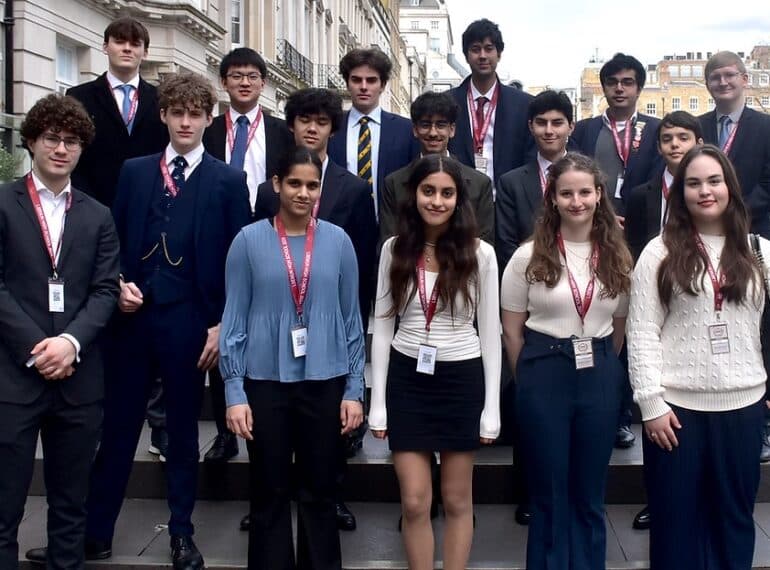
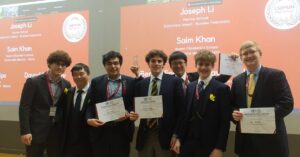 Saim Khan and Chanakya Seetharam were part of a nine-strong group from QE’s Year 12 who took part in the three-day debating event, which simulated the activities of the UN.
Saim Khan and Chanakya Seetharam were part of a nine-strong group from QE’s Year 12 who took part in the three-day debating event, which simulated the activities of the UN.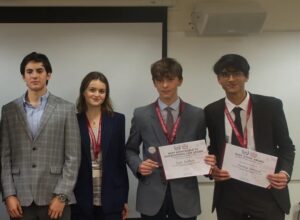 The QE delegates were split among the various committees, including the Security Council. They debated a wide range of topics, including both current conflicts and those of the past, such as the 1956-1957 Suez Crisis.
The QE delegates were split among the various committees, including the Security Council. They debated a wide range of topics, including both current conflicts and those of the past, such as the 1956-1957 Suez Crisis.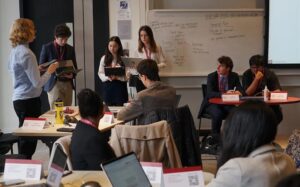 Saim relished his own role representing Malta (“not necessarily the world’s most geopolitically dominant nation”) at MUN. “Whilst I had to work much harder to establish my initial credibility and convince other delegates that the Maltese were even worth listening to, by the end of the three days I can confidently say that Malta had become the leader of the free world.”
Saim relished his own role representing Malta (“not necessarily the world’s most geopolitically dominant nation”) at MUN. “Whilst I had to work much harder to establish my initial credibility and convince other delegates that the Maltese were even worth listening to, by the end of the three days I can confidently say that Malta had become the leader of the free world.”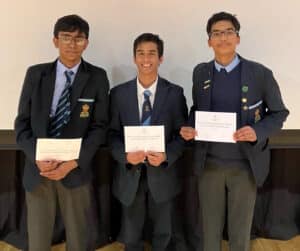 While the group were disappointed to miss out on the award for best medium-sized delegation (which went to Eton), they were, said Uday Dash, “extremely grateful to the conference for providing us with a platform to discuss real socio-economic and political matters that drastically affect our world today”.
While the group were disappointed to miss out on the award for best medium-sized delegation (which went to Eton), they were, said Uday Dash, “extremely grateful to the conference for providing us with a platform to discuss real socio-economic and political matters that drastically affect our world today”.